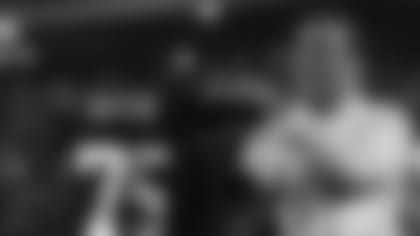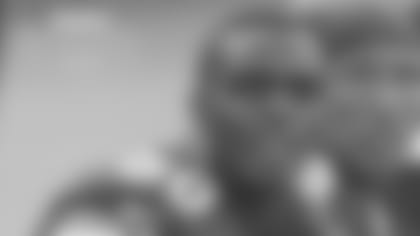Legends Series: Merril Hoge
Running Back
1987-93
Merril Hoge loves to look back on his days playing with the Steelers. His colleagues at ESPN, where he is an NFL analyst, will often joke that he still has a Steelers bias. But that isn't something that bothers Hoge, because he was proud of his time in the black and gold.
"What I try to do with my job, and this is what I've tried from day one, is to tell the truth and have evidence," said Hoge. "That will be tape or whatever, the study I do to get ready. Well it doesn't matter what I say about Pittsburgh. Nobody cares about the evidence, they say I'm just going to say all nice things about them. I've learned to say it with a little more juice now because I know that really makes them mad when I do that. I know so much about this organization. I've become one of those bridge players. I met Art Rooney Sr, 'The Chief,' when I first got here. No matter how I present it, I could say something bad about Pittsburgh and people will think I'm front running, so it doesn't matter what direction I go in, and I accept that and its fine."
Hoge came to the Steelers as a wide-eyed rookie from Pocatello, Idaho, a 10th round draft pick in 1987. He played seven seasons with the team, quickly learning what it meant to play for the black and gold on his first day on the job.
"I'm from Idaho. I had never been to a professional game," said Hoge. "The first professional game I ever saw, I played in. When I got drafted, I think everybody back in the day had that globe that spun, you know that ball? I had to go get that global map and think, gosh darn where's Pittsburgh?
"One of my best memories was the first day I walked through the doors and I saw the Super Bowl trophies. I went back and started training, and the first guy who came over to help me because I was doing it wrong was Chuck Noll. Then I go in the locker room and here comes Joe Greene. All I had ever done was watch the Steelers win Super Bowls on television, so to actually be in the environment like that at the time was still something I'll never forget."
Hoge also weighed in on a variety of other topics in this exclusive interview:
What did it mean to you to play for the Pittsburgh Steelers?"They were my favorite team as a kid. I loved them as a team, I loved everything about them. To not only have them be my favorite team, but to play for them, that was incredible."
Why were you a Steelers fan?"I think* *this is where a lot of Steeler Nation came from. In the 1970s you had really two sources to watch football. The main ones were Monday Night Football and the Super Bowl. Who was always on Monday Night Football and in the Super Bowl? The Steelers. And then, this added to it a little bit. I had this math class and there was this girl named Michelle. She was the most irritating Cowboys fan I had ever, ever, ever been around in my life. So on a Friday she would be wearing Cowboys stuff and she would be talking about the Cowboys and that made me love the Steelers even more cause it came down to Super Bowls and we'd have our arguments, who is going to win, and obviously the Steelers always won. I couldn't get to the bus fast enough to get to school on Monday to get into that math class to rub it in her face when the Steelers won. So she drove me to be a Steeler fan too because she was so irritating."
Who had the biggest impact on your career?
"The greatest man I've ever met, Chuck Noll. To this day, when I speak, when I go places, the lessons I've learned from him are there. If you really want to think about it, Heads up Football, they were all principles Chuck Noll taught. I was on the committee to help clean up youth football. And after they gave us that challenge I thought, how am I going to do that? I happened to look at my Steeler playbook I still had and I took Chuck Noll's principles of how you play the game because you're a better player if you play it right and you're a safer player if you play it right and that's what we needed in youth football. His legacy is going to live on because of that."
What were some of the lessons Chuck Noll taught you?
"The first one may be the most significant and it still resonates with me today and I still share today. In fact Mike Mularkey, head coach of the Tennessee Titans, used to play here, good teammate, asked me to go speak to the Titans and I will use this story. I use it everywhere I go when I talk to corporate people, youth football, NFL players. It was the Friday before opening day we were playing the San Francisco 49ers, and I had made the team so I'm going to live my dream. It will be the first time I've ever seen a professional game and I'm a player. Keep in mind the 49ers had won Super Bowls and they were supposed to win it again. And Chuck Noll had talked to us about it, they were our measuring stick because we were a young team.
"The first play, they called a pass play and I had to block the outside linebacker, run a flat route, quarterback threw to the other side of the field. The wide receiver had it, he was running, and the whistle blew. And they stopped the play and Chuck goes, 'Hey Merril what are you doing?' Well, my first thought was 'Oh God that linebacker had delayed and I hadn't seen him or blocked him. I'm not going to see my dream come true, he'd cut me right then. But he was in coverage, I'd done the right thing, I'd run it a hundred times, a thousand times actually, I'd done the right thing. But he asked me that because the ball was on the other side of the field and I wasn't doing anything. And he said that's the problem. He said I didn't keep you on this team to be a common football player. I can call anybody we just cut, I'll bring them back, and they'll do what you just did. He said I'll do one better, on Sunday, I'll pull someone out of the stands to do what you just did. I didn't keep you on this team to be a common player, I need you to be uncommon. I need you to give me maximum efforts. Your buddy over there is running for his life, go help him, don't just stand there, do something.
"Well, initially I was in fear I wouldn't see my dream come true. But then when I got back to my locker I thought about what he challenged me to do. I realized right at that time, I could do that. Even though I thought I had been doing as much as I could possibly do, there was another layer of expectations that he was expecting from the team. We have a chance to be special. Because we line up on Sunday, everyone's talented. What's going to separate us? Being uncommon. I made it a part of my game from then on."














